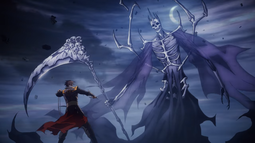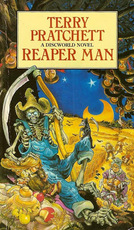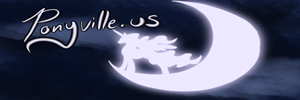No.1177656
File: 1728988429169.png (1.29 MB, 1920x1080, 16:9, hpuzg3l8pyy61.png) ImgOps Google

Time for some trope talk.
There's probably plenty of franchises out there that involve a hero going up against an evil pantheon.
There are definitely franchises out there where an "evil" entity such as Death is actually responsible for people and creatures dying since the dawn of time, or is responsible for the actions that take place to a soul after a person passes on.
So what actually happens when the hero slays the personification of Death (or War, or any other impactful entity)?
Does that mean nobody dies anymore?
That the souls are left to wander an eternity without guidance?
Does it simply mean that an avatar of Death, directly impacting the world is slain, but death itself keeps existing to perform its duties?
Or should we subscribe to the theory that the ancient entity is killed, but a new entity takes its place?
It probably differs depending on the source material, but what are some narrative examples where it really makes sense? And what are some examples that subscribe to "Don't care, evil is dead and that's good."?
No.1177663
File: 1729002736124.jpg (91.11 KB, 299x512, 299:512, unnamed.jpg) ImgOps Exif Google

My personal favorite instance of this has to be in the Discworld book "Reaper Man", which is definitely my favorite of the (admittedly few) Discworld books I have read. It definitely does help that Death is an actual, recurring character in this series with a genuine personality and quirks.
And, granted, he doesn't so much die in this one as he sort of gets fired for "caring too much", deciding instead to try and live, something that is completely alien to him. This results in him actually SAVING lives, seeing first hand the effect the passing of someone has on those they leave behind, etc. Definitely gives him a new perspective and what the end of a life means.
This book, however, goes with the "a new entity takes his place" theory already stated here, but in a different way. The new entity that springs into Death - who is a very classic Grim Reaper - is instead a maniacal being, even wearing a crown, who takes pride and sadistic pleasure in its task, where our "main" Death treated it as a duty and a job. A necessary one, if not one he always likes, but one where he at least always takes the time to gently let people know their time is up and sets them up off in their path for whatever comes next. According to the book, the new, "eviler" Death is shaped by people's perception of Death as a dark, evil and malicious thing rather than a fact of life. And one of the more powerful moments of the book, Classic Death counters the new Death, when the latter calls mortals "nothing but a harvest" with the question:
"For what can the harvest hope, if not the care of the reaper man?"
It's good stuff, what can I say.
Of course, the books B-plot is on the Funnie side of things. People and things do indeed stop dying, and it actually leads to there being an "overflow" of life, to the point where ideas start taking physical shape... With one of the big threats being what appears to be a Fantasy equivalent to a modern day supermarket.
... Yeah, Discworld is weird. In the best of ways.
